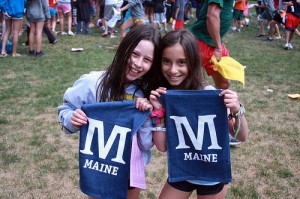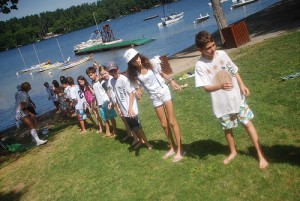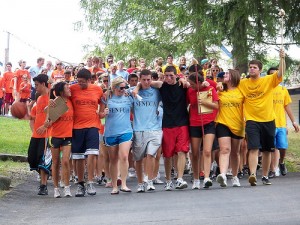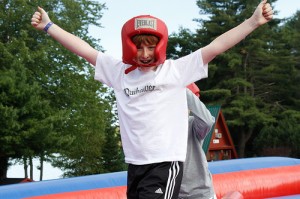 Sure parents send their children to summer camp to have fun. And letters home detailing exciting moments during the summer usually more than assure them that they’re getting their money’s worth. But did you know that summer camp also may improve a child’s performance in school?
Sure parents send their children to summer camp to have fun. And letters home detailing exciting moments during the summer usually more than assure them that they’re getting their money’s worth. But did you know that summer camp also may improve a child’s performance in school?
 For one, there is routine. Yes, it’s summer camp. Yes, your children are letting loose and having some serious fun. But they’re also maintaining a routine. Studies have shown that children who maintain regular routines get better grades than those who don’t. Many camp programs follow a schedule. Although the individual activities vary from day to day, campers know when they will eat meals, have day and evening activities, shower, and go to bed from day-to-day. Child-experts have noted that maintaining a routine helps children stay focused because it keeps their lives calm and predictable. When children feel calm and safe, they accept change more easily. By maintaining a schedule at camp, children are able to transition more easily from the previous school year into the new one. “Children handle change best if it’s expected and it’s handled in the context of a regular routine,” says Dr. Laura Markham, behavioral specialist. Dr. Markham also notes that routine helps children understand expectations. The faster children are able to transition into their new school year, get settled and understand expectations, the more likely they are to be successful.
For one, there is routine. Yes, it’s summer camp. Yes, your children are letting loose and having some serious fun. But they’re also maintaining a routine. Studies have shown that children who maintain regular routines get better grades than those who don’t. Many camp programs follow a schedule. Although the individual activities vary from day to day, campers know when they will eat meals, have day and evening activities, shower, and go to bed from day-to-day. Child-experts have noted that maintaining a routine helps children stay focused because it keeps their lives calm and predictable. When children feel calm and safe, they accept change more easily. By maintaining a schedule at camp, children are able to transition more easily from the previous school year into the new one. “Children handle change best if it’s expected and it’s handled in the context of a regular routine,” says Dr. Laura Markham, behavioral specialist. Dr. Markham also notes that routine helps children understand expectations. The faster children are able to transition into their new school year, get settled and understand expectations, the more likely they are to be successful.
Camp also provides social structure. Social structure helps children learn how to interact with other people. Ultimately, they  become better communicators. The benefit of being able to learn this process at camp is the camp social structure has a ready made support system. Summer camp promotes a strong sense of family and tradition. Emphasis is placed on the idea of each person being a valuable member of the camp family and the importance of individual contributions to the continuance of camp traditions. Camps tend to place emphasis on fun rather than appearance. Children are also encouraged to be curious. The atmosphere is very fun, playful, and nonjudgmental. In his 2006 article Why play, Toys, and Games are Important, author Dr. Toy (yes, that’s his real name) says that children feel free to be themselves when they are relaxed and having fun, which makes them better listeners and communicators. Students who are good communicators are less likely to feel frustrated in school.
become better communicators. The benefit of being able to learn this process at camp is the camp social structure has a ready made support system. Summer camp promotes a strong sense of family and tradition. Emphasis is placed on the idea of each person being a valuable member of the camp family and the importance of individual contributions to the continuance of camp traditions. Camps tend to place emphasis on fun rather than appearance. Children are also encouraged to be curious. The atmosphere is very fun, playful, and nonjudgmental. In his 2006 article Why play, Toys, and Games are Important, author Dr. Toy (yes, that’s his real name) says that children feel free to be themselves when they are relaxed and having fun, which makes them better listeners and communicators. Students who are good communicators are less likely to feel frustrated in school.
 As children mature at camp, they’re taught and given more responsibility. From the first day they arrive at camp, campers obeserve that there are certain rites reserved for specific age groups. They see that even they, as early campers, are not without their own special traditions. But they also learn that there are things to look forward to in getting older and becoming more experienced campers. Older campers take longer trips outside of camp and sometimes journey further away. They stay up later. They have more freedom of choice in their daily activities. There are also have rituals exclusive to mature campers, something that younger campers learn to look forward to when they were young campers and of which they anticipate being a part.
As children mature at camp, they’re taught and given more responsibility. From the first day they arrive at camp, campers obeserve that there are certain rites reserved for specific age groups. They see that even they, as early campers, are not without their own special traditions. But they also learn that there are things to look forward to in getting older and becoming more experienced campers. Older campers take longer trips outside of camp and sometimes journey further away. They stay up later. They have more freedom of choice in their daily activities. There are also have rituals exclusive to mature campers, something that younger campers learn to look forward to when they were young campers and of which they anticipate being a part.
Finally, there is the element of family in summer camp. Not only do children learn  to collaborate and be flexible by co-existing with others and participating regularly in team sports and challenges, they are given additional tools by Camp Directors and Staff who care very much about them and their development. Many camps utilize the services of professionals, such as MA Jeff Leiken, to implement special programs that help older campers prepare for high school and beyond by understanding how to maximize their potential for success.
to collaborate and be flexible by co-existing with others and participating regularly in team sports and challenges, they are given additional tools by Camp Directors and Staff who care very much about them and their development. Many camps utilize the services of professionals, such as MA Jeff Leiken, to implement special programs that help older campers prepare for high school and beyond by understanding how to maximize their potential for success.
Sure children have fun at summer camp! But they also learn and maintain healthy habits that help them transition into the role of good student between summers.
*For more information or to contact Jeff Leiken, please visit his website http://leiken.com.

 570-798-9831
570-798-9831